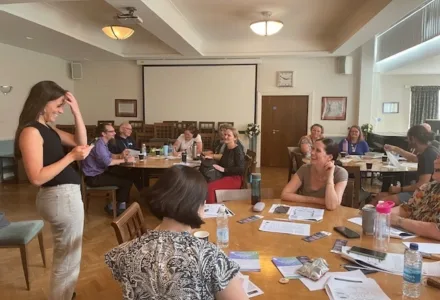This, free, online event provides a platform for members of the BGU autism
community to share details of their work.
Bishop Grosseteste University is pleased to be collaborating with the Participatory Autism Research Collective for the third time to present a range of perspectives in current autism research and practice. This event also forms part of the event programme for ARCH (Autism Resource and Community Hub), Bishop Grosseteste University’s own participatory autism group. The group is made up of staff, students, alumni, and other members of the wider BGU autism community.
Participatory autism research is defined as research where members of the autistic community have control over the research agenda and the analysis of, and reflection on, the data that is generated. It embeds the values of the draft framework for inclusive autism research (Chown et al., 2017), including that autism research should be aimed at improving the lives of autistic people.
Each participant in this symposium is a member of the wider autism community of Bishop Grosseteste University and will introduce an element of their current work.
Topics for the presentation will be:
Using ethnographic and phenomenological research with the autistic community.
Steven is an independent autism workplace consultant, mentor and educator, alongside being chairman of the Lincolnshire Autistic Society. He will be introducing the subject of using ethnographic and phenomenological research to develop data qualified as accurate by the autistic community. This will be related to his experience within the workplace, his experience as an educator, and also his personal experiences as an autistic individual accessing emergency care in the health service.
Key themes from the 13th Autism-Europe International Congress: Current and Conflicting thinking.
Alison is a non-autistic ally, a lecturer in SENDI, and was previously, a teacher, advisory teacher and SENCO. She studied at Brighton, Birmingham and Northampton universities and her current interest is reflective practice in collaboration with the autistic students she teaches.
Having had the opportunity to attend the 13th Autism-Europe International Congress, (a two-and-a-half-day event in Krakow, Poland) which presented current and conflicting thinking of both autistic and non-autistic researchers and practitioners, autistic people and their family members, Alison will report on some of the key themes being explored by autistic researchers.
The use of creative research methods in a case study of an autistic trainee teacher, including art, journaling, and poetry.
Susanna is a dyslexic, autistic, freelance teacher. She navigates her surroundings sensorily. She is curious about people, language, relationships, networks, humanity, and exploring her mixed heritage.
Susanna’s MA dissertation immersed her in nature to seek understanding, interpretation, and analysis of data gathered as part of a single case study of an autistic trainee teacher. She observed migratory swifts and used creative research methods, art, journaling, and poetry.
A parent's perspective on sharing Education Health and Care Plan (EHCP) information.
Gemma is a parent and educator. After a varied range of experiences dealing with the ECHP process from an education perspective as a head of faculty and subject lead within the secondary and the FE sector, Gemma has used these to form a collaborative partnership with the school through the EHC planning process to support her own daughter’s development through secondary school.
Maintaining an effective line of communication between home and school is the most important way to ensure that there is a positive experience for any pupil, but even more so for an autistic pupil. Creating that collaborative support network is even more important throughout secondary school. Being able to have a space to have those honest conversations helps to create a consistent supportive environment between both settings. This allows more opportunities for higher level engagement with their learning journey but also helps to provide that safe space for personal and social development to prepare them for life beyond the classroom.
Dr Clare (Kate) Lawrence, Head of Participatory Autism Research, East Midlands Convener for the Participatory Autism Research Collective (PARC) and L.C.C. Autism Champion explains:
“I am very excited that we are hosting this third participatory autism research symposium. We have a wide range of participants and perspectives; we are pleased to welcome members of the wider autism community - family and allies - as well as autistic speakers. It promises to be a lively and engaging discussion.”
The event is free to attend and is open to anyone who has an interest in autism, whether via lived experience, or in relation to their personal or professional lives.
Presentations from the previous symposium can be viewed online here.
Presenters at the Second BGU Participatory Autism Research Symposium in October 2021


Related Posts

Greater Lincolnshire Social Economy Academy event hosted on campus!

BGU Historian contributes expertise at UK-Ukraine Roundtable

Autism Art Club Exhibition

Ermine Library and Community Hub celebrates National Numeracy Day with local community!

Foundation Year Showcase 2025

Supporting Lincolnshire’s libraries and local history month
